In her first official address to the university, the newly inaugurated President Minouche Shafik proposed a new social contract between universities and society, while three groups of protesters chanted on.
“History is happening!” cheered a worker handing out wristbands early Wednesday morning. This moment is indeed historic: President Shafik is the first woman, and the first person of color, to serve as the president of Columbia University.
Her investiture ceremony began with a procession of guests and notable Columbians, including faculty, staff, and students, and was brimming with Columbia spirit. Low Library was decked in Pantone 292, speakers and notable guests sat under Alma Mater, and both Notes and Keys and a youth choir sang to welcome the new president.
Speeches from President Shafik’s friend and former colleague, Madame Christine LaGarde (who is currently President of the European Central Bank), co-chairs of the Board of Trustees David Greenwald and Claire Shipman, students, and faculty shared an appreciation for President Shafik’s commitment to education as a means of enhancing the world around her, and anticipation for her future initiatives. The ceremony also included the presentation of a set of keys and a copy of the 1754 charter of Columbia to President Shafik, a symbolic representation of the transfer of power.
President Shafik’s inaugural address, her first speech to the entire Columbia community, stressed the importance of universities as institutions and leaders. She proposed a new social contract between universities and societies, a natural extension of her recent book, What We Owe Each Other: A New Social Contract.
“What does the world need from a great university?” she asked, and answered: to educate students and leaders, to embrace curiosity that grounds discovery of new technology and new knowledge, and to engage and collaborate with their community. She concluded her remarks by reflecting on another trio: mushrooms, owls, and institutions.
Mycelium are the underground networks that connect mushrooms, and it is this sort of support and connection throughout the Columbia community that she hopes to enhance.
“I would like to offer… leadership that provides not only nourishment, but cross-pollination, promoting creativity and flowering in all its forms in our great institution,” she said.
Her remarks on owls provided an alternative to the traditional hawk/dove model of economics, as Madame LaGarde previously discussed. It is wisdom and observance, not a particular ideology, that she hopes to emulate.
Finally, institutions are pillars of strong, successful communities, she argued, and she hopes to continue to make Columbia into a strong institution that can support and uplift the society within it and around it.
“My vision of Columbia,” she said, “is an institution that is a friend to our neighbors, an asset to this nation, and a beacon in this world. So let us forge a new social contract with society and with each other that will make us an exemplar of a great institution and a great university in the 21st century.”
The ceremony concluded with “Roar, Lion, Roar,” as Roar-ee, the cheerleaders, and the dance team emerged to celebrate. The inauguration came with equal shares of criticism and celebration, however: three large protests chanted and whistled during most silent moments during the investiture ceremony, and sometimes overwhelmed the speakers.
“You would not have a Columbia welcome without protest,” the deputy mayor of New York, Ana Almazar, said early in the ceremony. Several speakers mentioned the protests, including President Shafik.
“The university is a home and sponsor of critics,” she said, discussing Socrates, and then chuckled as she glanced at the protests: “Need I say more?”
Students from the Vagelos College of Physicians and Surgeons and victims of Robert Hadden, a former Columbia obstetrician-gynecologist who was recently charged with sexually harassing and abusing over 500 women, alternately chanted “notify the patients,” “you protected Robert Hadden,” and “no justice, no peace.” They hope that Columbia will provide a more adequate response that includes notifying Hadden’s former patients of his conviction.
Sunrise Columbia, a chapter of a national organization of students advocating for climate action, carried a sign that read “Shafik In, Fossil Fuels Out.” With the new administration, the organization expects a greater commitment to climate action, including a stronger policy on divestment from fossil fuels.
Graduate student workers from the Columbia Postdoctoral Workers union marched across College Walk with signs and chants of their own: “pay us like you need us because you do,” one sign read. Álvaro Cuesta-Domínguez, an associate research scientist at Vagelos and an organizing committee member of the union, described their protest as a “practice picket” as they engage in tense negotiations with the university over a new contract to enhance working conditions and wages. “We are strike-ready,” Cuesta-Domínguez said in an interview with Bwog.
As President Shafik begins her presidency, which will include everything from responding to these controversies, facing the recent challenges to affirmative action, and continuing work on the Manhattanville campus, she promises to “meet fire with grace.” If the investiture ceremony is any indication, she is more than capable of doing so.
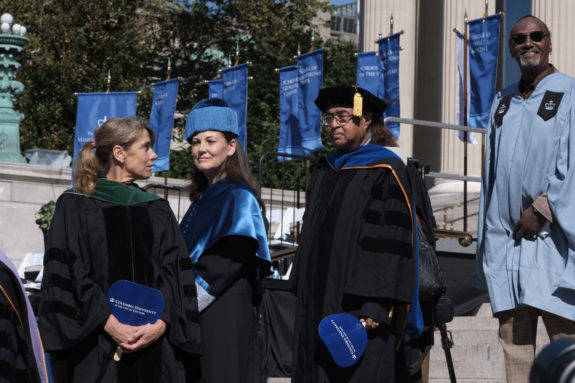
Academic Procession 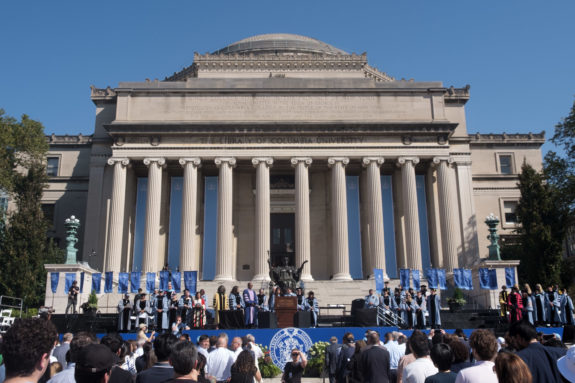
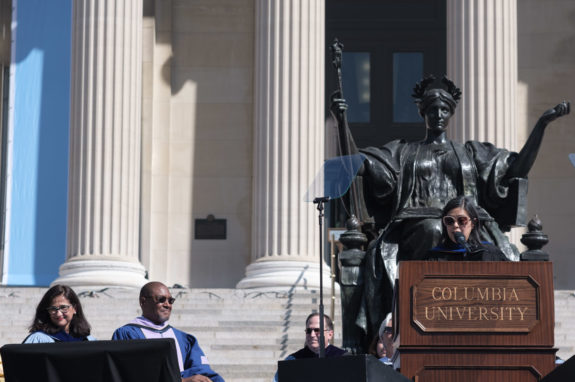
Eugenia Lean 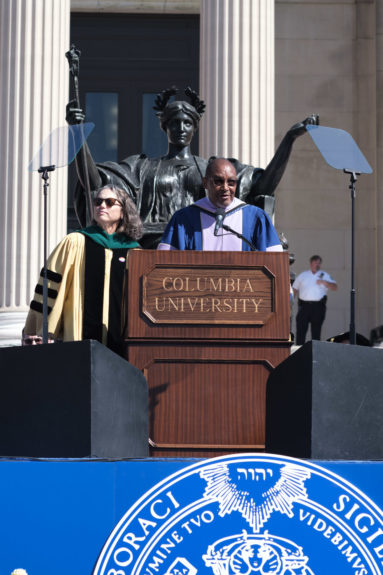
Katrina Armstrong and Dennis Mitchell 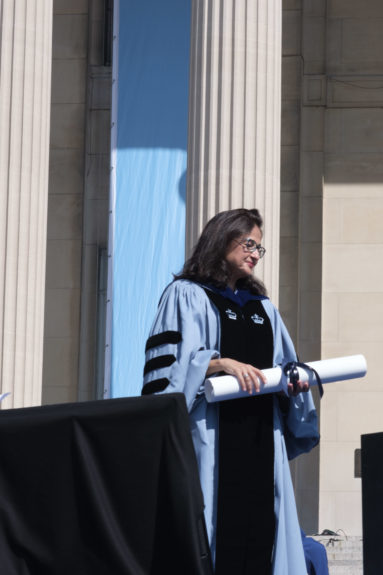
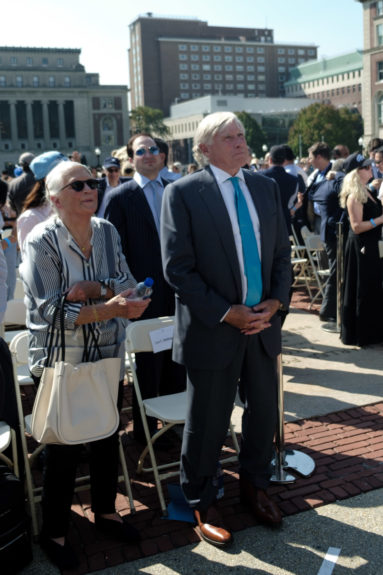
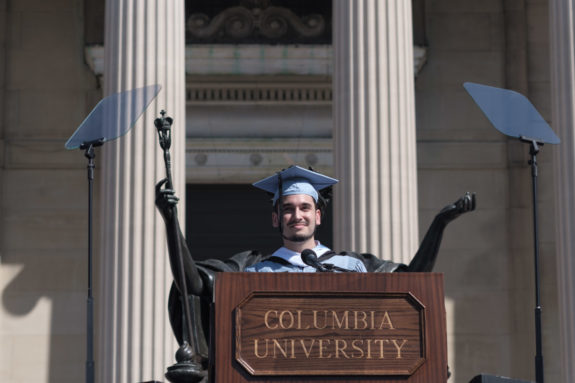
Bruce Goumain 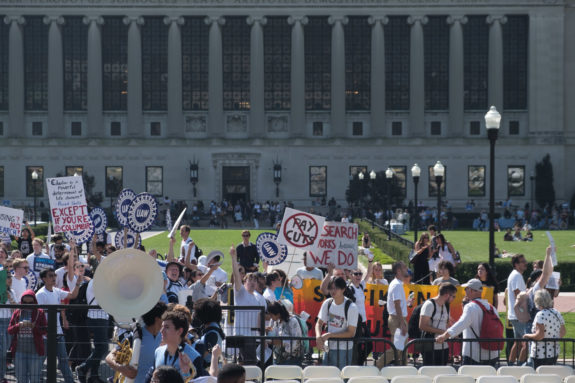
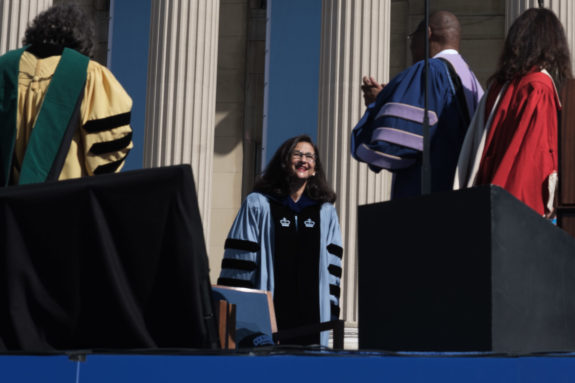
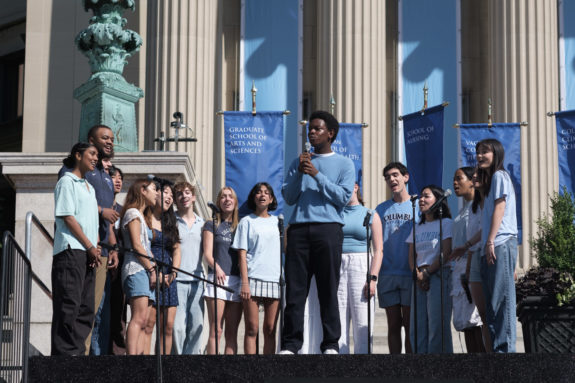
Notes and Keys 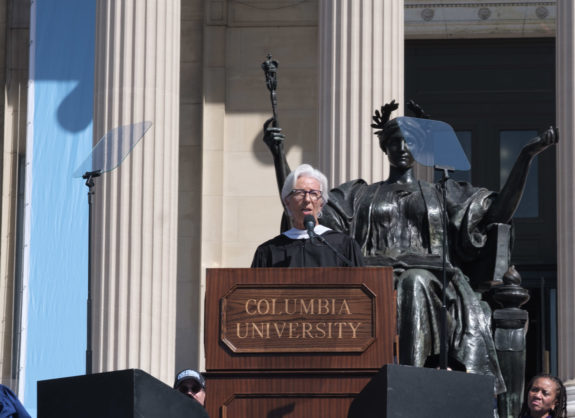
Madame Christine Lagarde 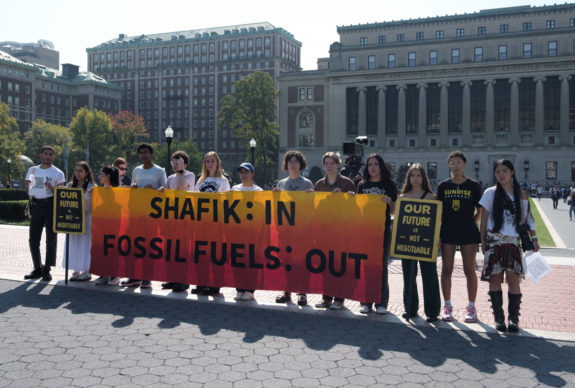
The full text of President Shafik’s inaugural address can be found here.
Photos via Elias Reville


 1 Comments
1 Comments
1 Comment
@alum What is happening with the expansion and renovation of Uris for the College?